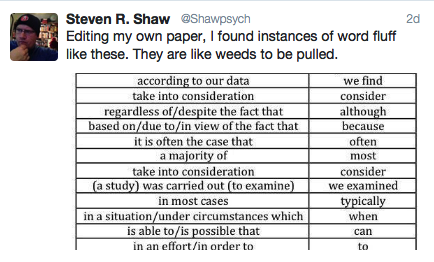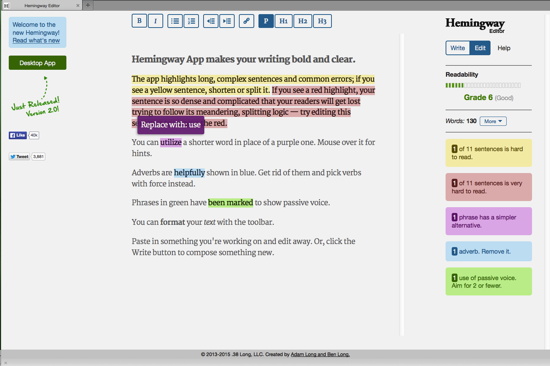The most valuable of all talents is that of never using two words when one will do.
Thomas Jefferson
I stumbled upon the following tweet by Steven R. Shaw on word fluff:

It reminded me about a feature I really want for writing software (e.g., Scrivener). An option that highlights the complicated phrases and suggests better ones.
It can’t be that hard. Just look at the options at Hemmingway App:
It suggests easier words and offers a lot of other interesting features. But it’s one of the few apps that do this. Which is strange, given that you can easily find lists of words and phrases to replace. For example, from Alley (1996, p. 120-122):
redundant words — the word in () adds nothing and should be deleted
- (already) existing
- (alternative) choices
- at (the) present (time)
- (basic) fundamentals
- (completely) eliminate
- (continue to) remain
- (currently) being
- (currently) underway
- (empty) space
- first (began)
- had done (previously)
- introduce (a new)
- mix (together)
- never (before)
- none (at all)
- now (at this time)
- period (of time)
- (private) industry
- (separate) entities
- start (out)
- (still) persists
- bright green (in color)
fat phrases that should be reduced to the simplest form
- at this point in time -> now
- at that point in time -> then
- has the ability to -> can
- has the potential to -> can
- in light of the fact that -> because
- in the event that -> if
- in the vicinity of -> near
- owing to the fact that -> because
- the question as to whether -> whether
- there is no doubt but that -> no doubt
writing zeros that usually can (should) be deleted
- as a matter of fact
- I might add that
- it is noteworthy that
- it is significant that
- it should be pointed out that
- the course of
- the fact that
- the presence of
In general, I can highly recommend Alley’s book (Alley, M. (1996). The Craft of Scientific Writing (3rd ed.). New York: Springer.). Great tips on technical and scientific writing. And hey, Hemmingway seems to have grown up. They now even have a Desktop app (haven’t tried it yet).
Of course, no software can replace the human mind. And there are some instances when you should break rules and recommendations in writing. But you should know when you break them unintentionally.

If you don’t mind having what you type instantly edited by an unseen power, you can set up TextExpander to do this automatically. Type “at this point in time” and the app will enter “now” instead.
It also corrects common misspellings. I’ve got a friend who is dyslexia. Frustrated that he makes the same spelling mistakes over and over again, I suggested he get TextExpander. In his case, that’s especially marvelous since those misspelling look fine to him.
I have no connection to the company, but here’s where you can find the app:
https://smilesoftware.com/TextExpander/index.html
There’s also an iOS version. And Scrivener and TextExpander do work together.
Here’s a good article on how TextExpander can save time.
http://chronicle.com/blogs/profhacker/smarter-typing-through-text-expansion/23725
–Mike Perry, Inkling Books
Thank you Mike, I really have to take a look at TextExpander. While I think there’s something to be said for a “revision mode” after writing, it might help to get the auto-replacement immediately.
Brett Terpstra’s Marked 2 app does exactly what you are looking for. You can open scrivener files in Marked 2 to highlight these writing problems. Every time you save in Scrivener, it automatically updates in the Marked preview.
Hoi Anita,
hey, I didn’t know Marked 2 — I’ll have a look at it, looks interesting. Thank you. 🙂
Best regards
Daniel
That is probably the most clever use for TextExpander I have ever read! I know of a script which corrects plain text files:
http://matt.might.net/articles/shell-scripts-for-passive-voice-weasel-words-duplicates/
And for removing personal style:
http://github.com/psal/anonymouth
You can install shell scripts that can help you catch “weasel words” and instances of passive voice. http://matt.might.net/articles/shell-scripts-for-passive-voice-weasel-words-duplicates/ Or there’s an Emacs mode that does the same thing. http://sachachua.com/blog/2011/12/emacs-artbollocks-mode-el-and-writing-more-clearly/
Cool, thank you 🙂